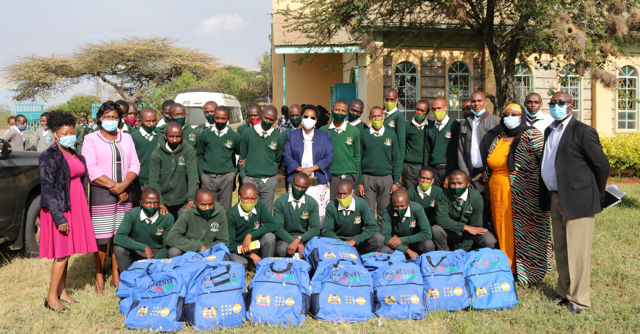STATEMENT ON OBSERVANCE AND CELEBRATION OF THE INTERNATIONAL YOUTH DAY
The National Gender and Equality Commission (NGEC) joins Kenya and the globe at large in commemorating this year’s International Youth Day (IYD). The day is celebrated each year (12th of August) under the United Nation’s General Assembly Resolution 54/120. The IYD provides member States with an opportunity to celebrate young people’s views and initiatives on a global scale, particularly towards the implementation of the Sustainable Development Goals (SDGs). The celebrations provide youth with the opportunity to draw the attention of governments and other stakeholders about issues affecting them. The commemoration recognizes the significant role of youth in shaping the present and future of the World. The theme of this year’s celebration is Transforming Food Systems: Youth Innovation for Human and Planetary Health.
The Committee on World Food Security (CFS), 2021 acknowledges that young people are among few key agents particularly in developing countries, necessary in the attainment of sustainable development. The sheer size of the youth population makes them a powerful force of change and transformation. In 2019, the United Nations estimated that youth (persons between ages 15 and 24) constituted 1.2 billion persons and this number is projected to grow by 7 per cent to 1.3 billion persons by 2030.
Kenya has a large youthful population with persons falling below the age of 35 years estimated at 75.1%, an equivalent of 35.7 million persons (KNBS, 2019). This number, if well utilized offers an opportunity for economic, social and political development. During the commemoration of the 2020 International Youth Day, the President of Kenya recognized youth as having a vast reservoir of energy, creativity, boldness and innovation and among the most valuable national resource. He appreciated that if they are provided with the right education, skills and opportunities to engage, they could become a powerful engine to accelerate economic growth as well as trigger social change.
Since then and in recognition of this massive power possessed by the youth, the Government of Kenya has continued to engage youth to promote and sustain food systems through adaptation of programs and policies that ease access to land, financing, mechanization, and knowledge and skill transfer. The Ministry of Information, Communications, Technology, Innovations and Youth Affairs in July 2020 launched the Kenya Youth Development Policy (KYDP), 2020 whose objective is to mainstream youth issues in all sectors of national development, within the public, private sectors, families and civil society. The policy provides the youth with an opportunity to contribute toward nation-building by actively participating in the achievement of the Big Four Agenda including food production and universal health coverage both of which form part of the 2021 IYD theme.
The Ministry of Agriculture has continued to implement the Kenya Youth in Agribusiness Strategy 2018-2022 that seeks to position the youth at the forefront of agricultural growth and transformation. The government has provided resources through the Youth Development Fund (YEDF) and Uwezo Fund to support youth-owned enterprises including businesses on the value food chain, food marketing and distributions, animal rearing and aquaculture, and sustainable diets and nutrition. In addition, there has been a rapid expansion and reform of technical, vocational education and training, increased investment in agricultural outreach programs, and expansion of the food systems innovation (Green) centres. The implementation of the Digital Financial Services (DFS) for agriculture and launch of various agronomic mobile phone applications including genuine seed selector tools, weather and early warning mobile tools, and agro insurance portals among others, position youth as future drivers of sustainable food security systems in Kenya.
At the same time, numerous challenges including access to proper agricultural and business skills, inadequate access to land and information, insufficient financial support, inadequate technical capacity, limited access to pre-established markets, occupational risks and hazardous work, inadequate representation of youth in the decision making in the food sector, and weak implementation of food systems related policies, hamper maximum participation of youth in the food production and marketing. The slow adoption of modern low-cost yet effective agricultural technology, low remuneration for farmworkers, and the perception of farming as a low cadre occupation turn youth away from effective food production systems. More recently, these challenges were exacerbated by the outbreak of the COVID-19 pandemic where youth in the sector lost revenue and markets.
As we celebrate this year’s IYD, the government, non-State actors and the private sector should continue to expand opportunities for involving youth in the food systems. Beyond being recipients and targets of new ideas, youth should be provided with safe space to formulate innovative solutions in the food sector. The County Governments should aim at full implementation of food and agriculture-related policies. In addition, the government should continue updating the inventory of youth innovators in all sectors including in food systems and put in enough measures to protect their intellectual property.
The Commission wishes to reconfirm its commitment to promoting gender equality and freedom from discrimination to among others, the youth of Kenya and ensure they are involved in all aspects of life.
Happy International Youth Day.
SIGNED
Dr. Joyce M. Mutinda (PhD)
Chairperson


Comments